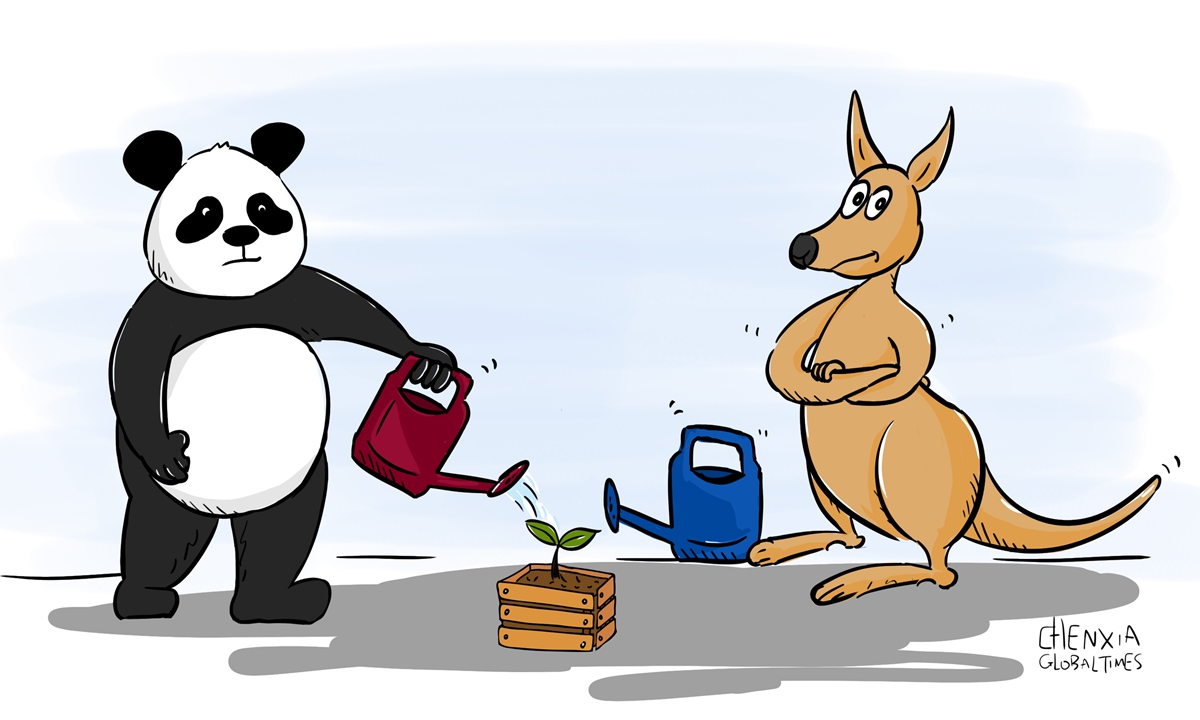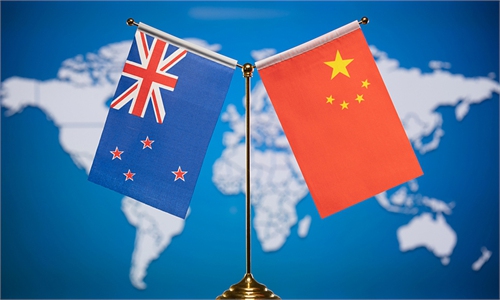Will Australia interfere with NZ’s China policy?

Illustration: Chen Xia/GT
Voices that accuse New Zealand of not being tough enough on China-related issues have been lately emerging in Western countries, especially Australia. New Zealand was even referred to as the "soft underbelly" of the Five Eyes alliance in a report written by the Canadian Security Intelligence Service as early as 2018. The term has been recently hyped up again by Australian media - news.com.au, which said, "There are concerns from New Zealand Five Eyes' allies that it may be the weak link in dealing with China."In the eye of the Five Eyes, there are many incidents that show Wellington's inconsistent acts with them. This January, New Zealand didn't issue a joint statement together with the other four members of the alliance to express "serious concern" about the situation in Hong Kong. Last month, New Zealand refrained from joining 14 countries, including the other four members of the Five Eyes, in questioning the WHO report on the origins of the novel coronavirus.
An Australian broadcaster even accused New Zealand of "backstabbing" Australia. Even though such a comment does not represent the attitude of the Australian government, it still reflects Australia's horrible mentality, as well as the country's diplomatic philosophy that puts ideology above everything else. As "the deputy sheriff of the US in the Asia-Pacific region," Australia has positioned itself as the hegemony of the South Pacific region. It sees New Zealand as its little brother who should be in line with it regarding China policies.
In fact, New Zealand, as a typical Western country, normally judges international affairs from the standpoint of developed Western countries. However, when Wellington has occasionally raised a different voice, it has caused Canberra deep confusion and discomfort.
Australia has an overwhelming advantage over New Zealand in terms of territory, population, and economic size. And it is New Zealand's second-largest trading partner. Thus, Canberra tends to consider Wellington's latest behavior as "backstabbing." However, this highlights the arrogance of some Australians, and also shows extreme disrespect for its neighbor.
On the other hand, in contrast to the deteriorating China-Australia relationship in recent years, the China-New Zealand relationship has been going well. In 2017, China overtook Australia as New Zealand's top trading partner. In January, China and New Zealand signed an agreement to upgrade their existing free trade pact.
During the same period, there was almost no substantive high-level dialogue between China and Australia, as the anti-China wave in Australia's domestic and foreign affairs was rising. The lack of communication and coordination has directly led to the escalating trade frictions between the two countries. Faced with the smooth development of China-New Zealand relations, Australia did not reflect on its own problems, but tried to use its influence to interfere with the foreign policy of its neighbors.
In the ongoing confrontation with China, Australia has repeatedly hurt Chinese companies and investments on the grounds of national security. This has been done at the expense of its own companies and people, and now Australia wants its neighbors to join in this lose-lose situation. After Australia issued the ban on Chinese tech giant Huawei, the company has terminated its millions of research and development investments in the country, and closed the research and development center there. High-tech workers lost their jobs, and the development of 5G technology in Australia lagged behind seriously. This decision has brought obvious negative effects on Australia's economic development and technological progress.
New Zealand, by contrast, attaches more importance to win-win cooperation and seeks the greatest common ground in bilateral relations from the perspective of development. This is also an important reason for the continuous development and breakthrough of China-New Zealand relations.
At present, the strategic competition between China and the US is becoming more and more complicated. As Washington increasingly pushes other countries to take sides, third countries besides China and the US are playing an increasingly important role in this game. Many countries have made an independent choice between following the US in containing China and deepening cooperation with China, in order to safeguard their vital interests.
Besides New Zealand, Germany, a critical US ally in Europe and the EU's largest economy, has not joined the US-led group challenging the WHO's report on global tracing of COVID-19 origins. More and more countries respect the facts and follow the trend of the times. In sum, the ideological diplomacy of countries such as the US and Australia is losing its market in international community.
The author is an assistant researcher at Asia Pacific and Global Strategy, Chinese Academy of Social Sciences. opinion@globaltimes.com.cn

